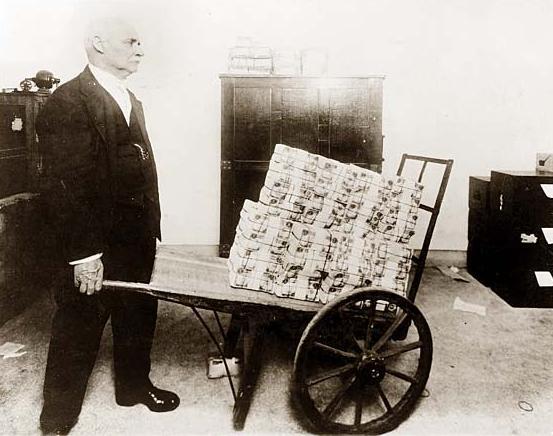
– Spain And Italy Are Toast Unless Germany Allows The ECB To Print Trillions Of Euros (Economic Collapse, Aug 2, 2012):
The financial chess game in Europe is still being played out, but in the end it is going to boil down to one very fundamental decision. Is Germany going to allow the ECB to print up trillions of euros and use those euros to buy up the sovereign debt of troubled eurozone members such as Spain and Italy or not? Nothing short of this is going to solve the problems in Europe. You can forget the ESM and the EFSF. Anyone that thinks they are going to solve the problems in Europe is someone that would also take a water pistol to fight a raging wildfire. No, the only thing that is going to keep Spain and Italy from collapsing under the weight of a mountain of debt is a financial nuke. The ECB needs to have the power to print up trillions of euros and use that money to buy up massive amounts of sovereign debt in order to guarantee that Spain and Italy will be able to borrow lots more money at very low interest rates. In fact, this is probably what European Central Bank President Mario Draghi has in mind when he says that he is going to “do whatever it takes to preserve the euro”. However, there is one giant problem. The ECB is not going to be able to do this unless Germany allows them to. And after enduring the horror of hyperinflation under the Weimar Republic, Germany is not too keen on introducing trillions upon trillions of new euros into the European economy. If Germany allows the ECB to go down this path, Germany will end up experiencing tremendous inflation and the only benefit for Germany will be that the eurozone was kept together. That doesn’t sound like a very good deal for Germany.
Right now, the yield on 10 year Spanish bonds is above 7 percent and the yield on 10 year Italian bonds is above 6 percent.
Those are unsustainable levels.
The only thing that is going to bring those bond yields down permanently to where they need to be is unlimited ECB intervention.
But that is not going to happen without German permission.
Meanwhile, the situation in Spain gets worse by the day.
An article in Der Spiegel recently described the slow motion bank run that is systematically ripping the Spanish banking system to shreds….
Capital outflows from Spain more than quadrupled in May to €41.3 billion ($50.7 billion) compared with May 2011, according to figures released on Tuesday by the Spanish central bank.
In the first five months of 2012, a total of €163 billion left the country, the figures indicate. During the same period a year earlier, Spain recorded a net inflow of €14.6 billion.
If those numbers sound really bad to you, that is because they are really bad.
At this point, authorities in Spain are starting to panic. According to Graham Summers, Spain has imposed the following new capital restrictions during the last month alone….
- A minimum fine of €10,000 for taxpayers who do not report their foreign accounts.
- Secondary fines of €5,000 for each additional account
- No cash transactions greater than €2,500
- Cash transaction restrictions apply to individuals and businesses
How would you feel if the U.S. government permanently banned all cash transactions greater than $2,500?
That is how crazy things have already become in Spain.
Read moreSpain And Italy Are Toast Unless Germany Allows The ECB To Print Trillions Of Euros

